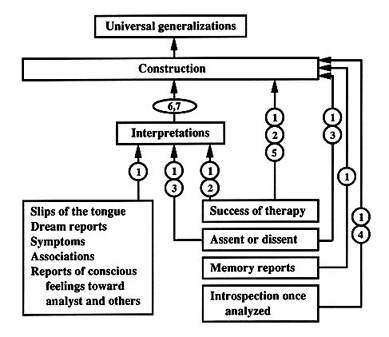Problem 6: Problems with Extrapolation to Slips and Dreams
Freud holds a compromise-formation model of neurotic symptoms, slips of the tongue (parapraxes), and manifest dream content, according to which such bungles are caused by the conflict of conscious wishes with (repressed) unconscious wishes. If a repression emerges into consciousness via free associations, then the prior presence of that repression is taken to be the cause of the symptom, slip, or dream.
Breuer and Freud had marshaled prima facie impressive threapeutic support for the repression etiology of neurotic symptoms. Not so the repression etiology of slips and dreams. Lifting of a repression to which a slip is attributed is unlikely to enable the person to correct the slip and avoid its repetition or other slips in the future. Likewise, lifting of a repression to which manifest dream content is attributed is unlikely to prevent the dream's recurrence. Thus, extrapolation from neurotic symptoms to slips and dreams is unwarranted by the therapeutic evidence.
The figure below (Von Eckardt, 1986) represents epistemological problems in Freud's use of clinical data as discussed by Grünbaum (1984) (circled numbers correspond to numbered problems at left; arrows represent the relation "is considered evidence for").

LEVELS
PROBLEMS
- suggestibility (pp. 130-135);
- failure of tally argument (pp. 135-172);
- weakness of consilience argument (pp. 273-278);
- Nisbett and Wilson findings (pp. 147-148);
- problems with Breuer-Freud argument (pp. 177-189);
- problems with extrapolation to slips and dreams (pp. 190-239);
- problems with establishing causal claims by retrospective testing (pp. 177-189).
References
Grünbaum, A. (1984). The foundations of psychoanalysis: A philosophical critique. Berkeley, CA: University of California Press.
Von Eckardt, B. (1986). Grünbaum's challenge to Freud's logic of argumentation: A reconstruction and an addendum. The Behavioral and Brain Sciences, 9, 262-263.
Last modified January 1999
Visited times since July 2001
Comments?
Home to Psychoanalysis
Home to Great Ideas in Personality
